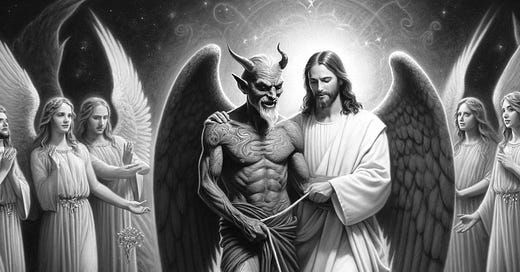Illustration: The redemption of the Devil, which Flaubert reports is part of the Divine Plan.
Note to the reader:
…why Flaubert?
One might ask why Flaubert has turned out to be, so to speak, a “voice of authority” here and elsewhere in my writings.
I will explain this to the reader, and very in simple terms that everyone, even idiots such as myself, can understand quite easily, and without going into a great deal of detail.
At the beginning of Beelzebub’s Tales to His Grandson, Gurdjieff invokes Beelzebub himself, a demon of considerable erudition and standing, to act as his avatar for the various ideas he expounds on. One thus has to listen to everything important (or otherwise, and there is a lot of otherwise) which he says out of the mouth of a devil.
Beelzebub, after one gets over his essentially evil nature, turns out to be a nice enough guy in the end.
I, on the other hand, am saying important things out of the mouth of a lovable little white dog. Flaubert, unlike the devil, does NOT have an essentially evil nature. Already an high-ground advantage. Furthermore, unlike Beelzebub, who has been appointed by an earth human (Gurdjieff) to act as his spokesperson, Flaubert has been appointed by God and the universe to…
Well, to be FLAUBERT.
And it seems self-evident that it’s better better to be Flaubert—or just about anyone else, for that matter—instead of the devil.
Ah.
So, to decide whether you would rather listen to things said by a demon or a lovable little white dog on a mission from God.
So difficult, eh?
Following on this, we can begin to examine the question of redemption.
Keep reading with a 7-day free trial
Subscribe to Zen, Yoga, Gurdjieff: Lee's Gurdjieff Newsletter to keep reading this post and get 7 days of free access to the full post archives.





